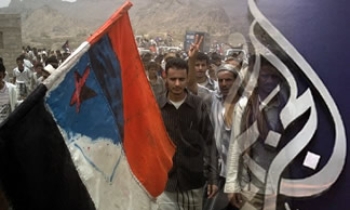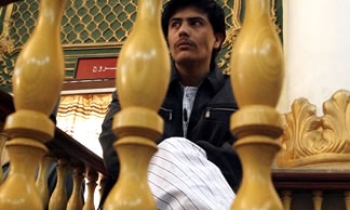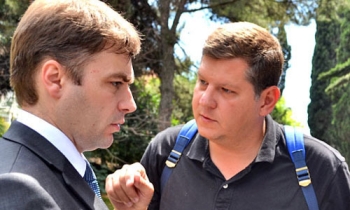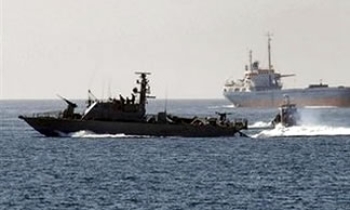NEW YORK/LONDON (Hollywood Reporter) - The news, when it came to CBS News in New York early on Memorial Day, May 29, was horrifying.
A car bomb had exploded in a relatively quiet Baghdad neighborhood as a CBS News crew was following a U.S. Army Fourth Infantry Division unit on a routine patrol. Cameraman Paul Douglas and soundman James Brolan were killed instantly, along with the soldier they were following and his translator; correspondent Kimberly Dozier was gravely injured.
The deaths of Douglas and Brolan sent shock waves through the news centers in London and New York, deeply affected the small fraternity of foreign correspondents who cover wars and served as another reminder of the dangers that journalists face every day. It was even more so, in the words of one veteran CBS News correspondent, because Douglas and Brolan were considered among the most steady and careful journalists around.
The war in Iraq has killed at least 77 journalists since it began in March 2003, according to the Washington-based Committee to Protect Journalists. Many more have been injured by fire from both sides, rocket attacks and roadside bombs. But the deaths of the CBS crew, January's severe injuring of ABC News anchor Bob Woodruff and cameraman Doug Vogt and the kidnapping and 82-day ordeal of Christian Science Monitor reporter Jill Carroll has highlighted the dangers that many say have always been there. And it's not just in Iraq: Two Fox News journalists were held captive for two weeks last month in Gaza until international efforts led to their release.
"There's no respect for the neutrality of journalists. I went into wars waving my press card, and I could go from one side of the lines to the other, and now it's extremely difficult to do that. We're often targeted," said Allen Pizzey, a CBS News correspondent who has covered wars since Angola in 1975.
It's that targeting that Pizzey and other foreign correspondents -- and their network bosses -- say has made it even more difficult to cover wars and to ask correspondents, their crews and others who work with them to risk making the ultimate sacrifice.
"The most dangerous place on Earth is Iraq," CNN International president Chris Cramer said. "Many organizations have made the decision that it's not worth the risk there, and I respect them for that."
CBS News senior vp Linda Mason said, "Ever since the IEDs (improvised explosive devices), it's been a whole new kind of warfare, and we've been having to figure it out as we go along. Other wars, ironically, seem safe in comparison to this. They weren't, of course, but this is so random. When you have a terrorist who is willing to rig a car bomb and remotely detonate it, that's real hard to guard against."
It's an event that news organizations covering Iraq -- and any other foreign hot spot, for that matter -- have spent millions of dollars trying to guard against with crisis and medical training for each journalist, often strict rules about whether a particular story is worth doing, and in every case, armed security people who are often former Special Forces soldiers whose job it is to keep the journalists safe. It's also a major reason why all assignments to Iraq are voluntary.
"You have to have a culture where it's OK to say, 'I don't want to do this' or to say, 'Tomorrow might be safer than today,"' Cramer said. "Careers at CNN are not measured by the ability to go to a hostile environment."
Cramer's boss, CNN's Jim Walton, agrees: "We want to be the industry standard for what we provide them in the field. Part of that means taking measures to make sure they're secure. ... We're operating in some regions where the media is a target, and that brings with it a whole set of challenges on a grander scale than we've ever had to deal with."
Making sure that doesn't happen in Iraq is the job of the networks' security people, who in extreme cases tell correspondents what they can and cannot do in and around Baghdad and in every case partner with the journalists to help keep them safe. Some, like CNN's security, have had to return fire.
"I never in my life dreamt that I would have to have security guards," Pizzey said recently from Beirut. "And when I first worked with them in Baghdad, I found it extremely uncomfortable, extremely difficult. Now I wouldn't go there without them. It's just a different world."
NBC News correspondent Richard Engel, who has reported extensively in Iraq and the Middle East, said that in the recent conflict between Israel and Hezbollah, where journalists went out of their way to be identified, putting network logos and "TV" on their cars and letting everyone know when and where they'd be going. You'd never do that in Iraq, he said.
Engel, who said when he's in Iraq he tries to go out every day, also does what he can to minimize the risk.
"You feel like you are hunted down, and you are hunted, so you take a low profile. You don't tell anyone where you're going, and you don't mark your vehicles in any way," Engel said recently from Beirut. "You try and blend in to the local population as much as possible, get in, do what you need to do and retreat back to relative safety as quickly as possible."
BBC Baghdad correspondent Andrew North and other correspondents say they're concerned about many dangers in Iraq, not just bombs and mortars but also the too-real possibility that they could be kidnapped and, as happened to the Wall Street Journal's Daniel Pearl, killed on camera.
"It's a very hard life. You're constantly on the lookout, you hear bombs and gunfire every day. Living that life, it's like the shadow of death is hanging over," North said. "It's hard on us, and it's hardest on all of our Iraqi colleagues."
BBC World editor Jonathan Williams said the heaviest burden anyone in a news management position has is knowing you're putting people at risk.
Pizzey, a close friend of Douglas, earlier this summer turned down an assignment to Baghdad, the first time in his 31-year career. He was willing to go later in the year, but not right then. "I just felt it was too soon after Paul and James were killed," he said. "I just felt I didn't want to be there right now."
He said their deaths turned attention to the risks more than ever before.
"Particularly because of Paul and James, because they were guys who were known to be smart, careful, who actually told overeager people to 'go to hell, we're not doing that. They were not afraid to say no. They would not be forced into doing anything," Pizzey said. "It sent a chill right through the business at our end, those of us who are out here."
ABC News correspondent Dan Harris, who spent many months in Iraq with Brolan and whose office in New York is next to Bob Woodruff's, said that he looks at his job differently now.
"I went at it not with the idea that I could never get hurt, but I think I went at it with a little bit more gusto and a little less introspection," Harris said. "A couple of months after Bob got hurt, I went back to Baghdad, and that was really a tough decision for me to make. I think about it now all the time. It makes you much more cognizant of the dangers, and the idea that it can't happen to you is completely obliterated."
Neither Engel nor Harris begrudge anyone who has had enough.
"I still go back, and I still think it's a very important story to tell, and I try to take as many precautions as possible," Engel said. "Every time there's an incident, you have to accept that this is something that could happen to you. But with all of the American commitment there (in Iraq), and the tremendous amount of American soldiers on the ground and what's happening on the ground itself, I personally can't walk away from it at this point."
But for the reporters, it comes down to doing the job and not taking any unnecessary risks. Pizzey carries with him a lesson from an early editor: You can't file a story if you're dead.
"In television in particular, you have a lot of responsibility, because people will follow you. Camera crews will try to do their best for you. So you have to think about the danger you're putting them into, what you're asking them to do," Pizzey said. "You have to think if the story is worth it. And if you want to get into this business, you shouldn't be in it to do wars. The wars are part of it. They're not everything."
Reuters/Hollywood Reporter









